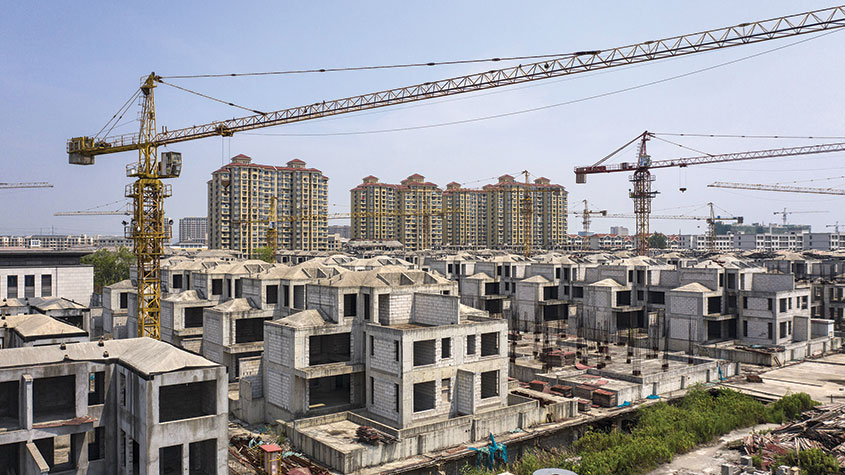China’s property downturn deepens
Chinese house prices have fallen for ten months in a row, made worse by a residential “mortgage strike”.

Get the latest financial news, insights and expert analysis from our award-winning MoneyWeek team, to help you understand what really matters when it comes to your finances.
You are now subscribed
Your newsletter sign-up was successful
Want to add more newsletters?

Twice daily
MoneyWeek
Get the latest financial news, insights and expert analysis from our award-winning MoneyWeek team, to help you understand what really matters when it comes to your finances.

Four times a week
Look After My Bills
Sign up to our free money-saving newsletter, filled with the latest news and expert advice to help you find the best tips and deals for managing your bills. Start saving today!
“China’s deepening property bust is sending shock waves through the nation’s 400 million-strong middle class,” says Bloomberg News. House prices have fallen for ten months in a row. That is putting pressure on households, whose leverage has risen from 27.8% of GDP in 2011 to 61.6% at the end of 2021.
A rise in homebuyers going on “mortgage strike” – stopping payments on uncompleted flats – is piling further pressure onto developers, says Evelyn Cheng on CNBC. S&P Global Ratings thinks that Chinese “property sales will probably drop by about 30% this year”. That would be worse than the 20% slump that the market suffered in 2008. China’s housing sales amounted to more than $2trn last year, making the sector a crucial driver of the world’s second-largest economy, says Jacky Wong in The Wall Street Journal.
The mortgage boycott risks fuelling a “vicious cycle: potential homebuyers stay away, which worsens developers’ ability to raise money to complete projects”. The economic fallout from China’s zero-Covid-19 lockdowns is not helping. While Beijing has so far avoided a sector-wide bailout, the economic damage and the stress on indebted local governments are likely to force it to “provide a backstop so that homebuyers regain confidence”.
MoneyWeek
Subscribe to MoneyWeek today and get your first six magazine issues absolutely FREE

Sign up to Money Morning
Don't miss the latest investment and personal finances news, market analysis, plus money-saving tips with our free twice-daily newsletter
Don't miss the latest investment and personal finances news, market analysis, plus money-saving tips with our free twice-daily newsletter
Don’t count on a “decisive policy shift”, says Nicholas Spiro in the South China Morning Post. Problems in Chinese property are “a direct result of Beijing’s efforts to deleverage the economy and de-risk the financial sector”. To rescue the property developers would be to abandon that goal. Beijing won’t unleash a “shock-and-awe... response” because, as Tyran Kam of Fitch Ratings puts it, the aim is to “stabilise the property sector without bailing it out”.
Get the latest financial news, insights and expert analysis from our award-winning MoneyWeek team, to help you understand what really matters when it comes to your finances.
Alex is an investment writer who has been contributing to MoneyWeek since 2015. He has been the magazine’s markets editor since 2019.
Alex has a passion for demystifying the often arcane world of finance for a general readership. While financial media tends to focus compulsively on the latest trend, the best opportunities can lie forgotten elsewhere.
He is especially interested in European equities – where his fluent French helps him to cover the continent’s largest bourse – and emerging markets, where his experience living in Beijing, and conversational Chinese, prove useful.
Hailing from Leeds, he studied Philosophy, Politics and Economics at the University of Oxford. He also holds a Master of Public Health from the University of Manchester.
-
 Early signs of the AI apocalypse?
Early signs of the AI apocalypse?Uncertainty is rife as investors question what the impact of AI will be.
-
 Reach for the stars to boost Britain's space industry
Reach for the stars to boost Britain's space industryopinion We can’t afford to neglect Britain's space industry. Unfortunately, the government is taking completely the wrong approach, says Matthew Lynn
-
 UK wages grow at a record pace
UK wages grow at a record paceThe latest UK wages data will add pressure on the BoE to push interest rates even higher.
-
 Trapped in a time of zombie government
Trapped in a time of zombie governmentIt’s not just companies that are eking out an existence, says Max King. The state is in the twilight zone too.
-
 America is in deep denial over debt
America is in deep denial over debtThe downgrade in America’s credit rating was much criticised by the US government, says Alex Rankine. But was it a long time coming?
-
 UK economy avoids stagnation with surprise growth
UK economy avoids stagnation with surprise growthGross domestic product increased by 0.2% in the second quarter and by 0.5% in June
-
 Bank of England raises interest rates to 5.25%
Bank of England raises interest rates to 5.25%The Bank has hiked rates from 5% to 5.25%, marking the 14th increase in a row. We explain what it means for savers and homeowners - and whether more rate rises are on the horizon
-
 UK inflation remains at 8.7% ‒ what it means for your money
UK inflation remains at 8.7% ‒ what it means for your moneyInflation was unmoved at 8.7% in the 12 months to May. What does this ‘sticky’ rate of inflation mean for your money?
-
 Would a food price cap actually work?
Would a food price cap actually work?Analysis The government is discussing plans to cap the prices of essentials. But could this intervention do more harm than good?
-
 Is my pay keeping up with inflation?
Is my pay keeping up with inflation?Analysis High inflation means take home pay is being eroded in real terms. An online calculator reveals the pay rise you need to match the rising cost of living - and how much worse off you are without it.